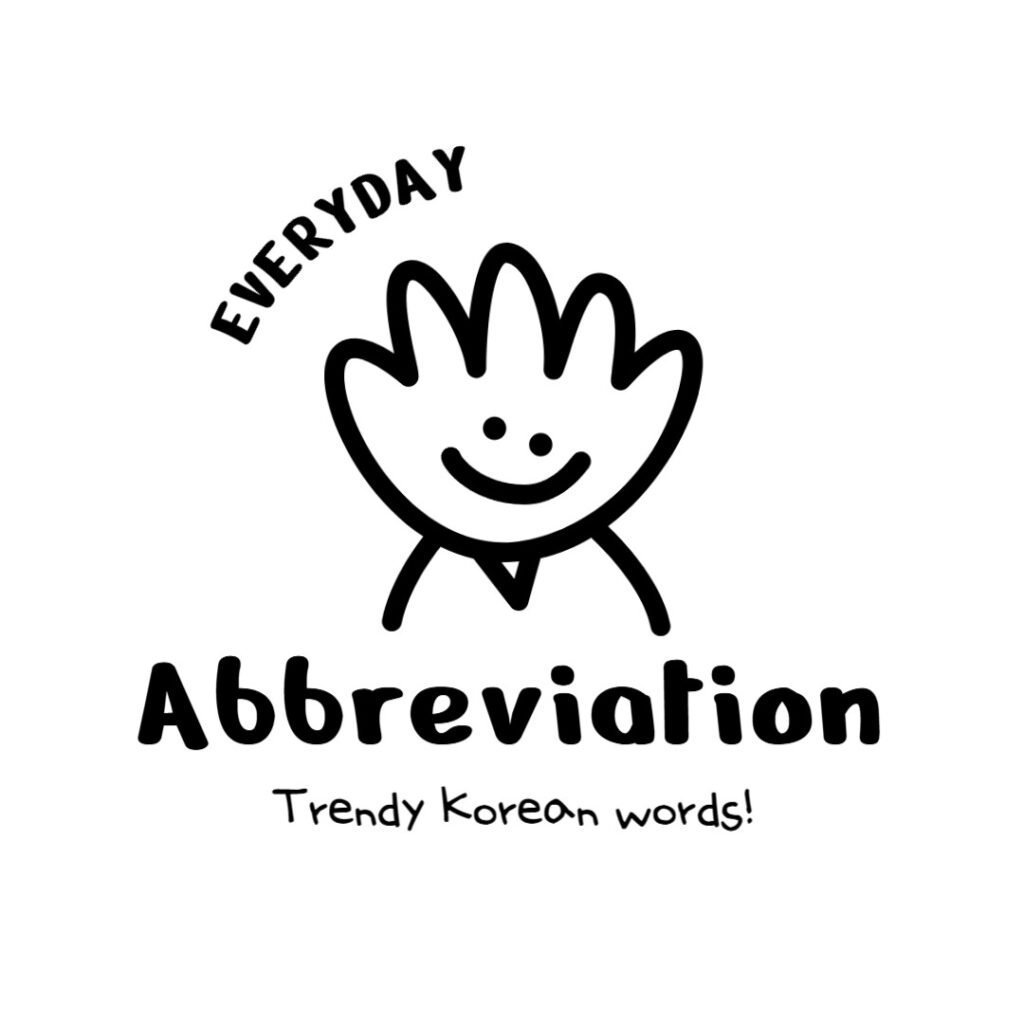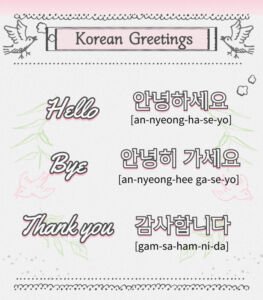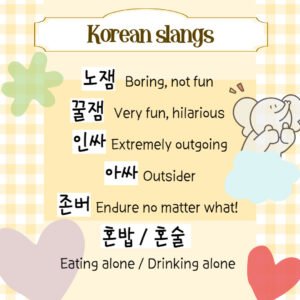Mastering Korean Abbreviations: Speak Like a Native!
Ever heard someone say “치맥,” “워라밸,” or “얼죽아” and felt completely lost? Don’t worry—you’re not alone! Koreans love using shortened words and phrases in everyday conversation, making speech faster, more fun, and sometimes even trendier.
In this post, we’ll break down some of the most commonly used Korean abbreviations so you can use them with confidence. Let’s dive in and upgrade your Korean skills!
1. 남사친 / 여사친 (A guy friend/ A girl friend)
Meaning
Friends who are “guys” or “girls”
Origin
It’s an abbreviation of 남자 사람 친구 (guy person friend) and 여자 사람 친구 (female person friend).
Usage:
– 걔 내 남친 아니야. 내 남사친이야!
(He’s not my boyfriend; he’s my guy friend!)
– 걔는 내 가장 친한 여사친 중 한 명이야.
(She’s one of my closest girl friends.)
2. 혼밥 / 혼술 (Eating alone / Drinking alone)
Meaning
Eating or drinking alone
Origin
혼밥: 혼자 + 밥 (alone + meal)
혼술: 혼자 + 술 (alone + alcohol)
Usage:
– 요즘 혼밥하는 사람 많아
(There are a lot of people eating alone these days.)
– 난 항상 혼밥 해
(I always eat alone.)
– 스트레스 받으면 혼술해
(I drink alone when I’m stressed.)
3. 갑분싸 (Sudden awkward silence)
Meaning
A situation where the mood suddenly becomes awkward or silent.
Origin
갑자기 분위기 싸해짐 (the atmosphere suddenly turned cold).
Usage:
– 걔가 이상한 말해서 갑분싸 됐어.
(He said something weird, and the mood suddenly got awkward.)
– 갑분싸 만들지 말고 그냥 넘어가자.
(Don’t make it awkward; let’s just move on.)
4. 인싸 / 아싸 (Insider / Outsider)
Meaning
인싸: Someone who is popular and socially active.
아싸: Someone who is introverted or prefers to stay out of social circles.
Origin
인싸: 인사이더 (insider).
아싸: 아웃사이더 (outsider).
Usage
– 걔는 진짜 인싸야. 사람들하고 금방 친해져.
(He’s such a social butterfly. He quickly becomes friends with everyone.)
– 나 아싸라서 친구 없어.
(I’m not very social, so I don’t have any friends.)
– 나는 자발적 아싸야. 혼자 있는게 좋아.
(I’m a loner by choice. I like being on my own.)
5. 엄친아 / 엄친딸 (Mom’s friend’s son / daughter)
Meaning
엄친아: A guy who is often seen as perfect, like the ideal son or someone who’s superior in every way, often compared to others.
엄친딸: The female counterpart, a girl who is also seen as perfect or highly accomplished, often used to describe a friend’s daughter who excels in everything.
Origin
엄친아: 엄마의 친구 아들 (Mom’s friend’s son)
엄친딸: 엄마의 친구 딸 (Mom’s friend’s daughter)
Usage:
– 걔 엄친아라서 공부도 잘하고 운동도 잘해
(He’s like the perfect guy —he’s good at both studying and sports.)
– 엄마는 나랑 그 엄친딸이랑 매일 비교해. 짜증나
(My mom compares me to that perfect daughter every day. It’s so annoying.)
* 엄친아 is more commonly used than 엄친딸. We also use 알파메일/육각형 남자 these days—same meaning! Hahaha.
6. 치맥 (Chicken + Bear)
Meaning
치킨 + 맥주: A popular pairing of fried chicken and beer, considered a quintessential Korean comfort food.
Origin
치킨 (Chicken) + 맥주 (Beer) = 치맥
Usage
- 오늘 저녁에 치맥 어때?
(How about chicken and beer tonight?) - 야구 보면서 치맥 먹는 게 최고야.
(Eating chicken and beer while watching baseball is the best.) - 친구들이랑 치맥 먹으러 갔어.
(I went out to eat chicken and drink beer with friends.)
7. 워라밸 (Work-Life Balance)
Meaning
Work-life balance: The harmony between your professional and personal life.
Origin
워크 (Work) + 라이프 (Life) + 밸런스 (Balance) = 워라밸
Usage
- 요즘 워라밸이 안 맞아서 너무 피곤해.
(I’m so tired these days because my work-life balance is off.) - 우리 회사는 워라밸을 중요하게 생각해요.
(My company values work-life balance.)
8. 얼죽아 (Even if I freeze to death, Iced Americano!)
Meaning
얼어 죽어도 아이스 아메리카노: Refers to people who always prefer iced Americano, even in freezing weather.
Origin
얼어 죽어도 (Even if I freeze to death) + 아이스 아메리카노 (Iced Americano) = 얼죽아
Usage
- 나 얼죽아야.
(I get iced Americano even if I freeze to death) - 얘는 진짜 얼죽아네. 이렇게 추운데도 아아야?
(She’s really an “eoljuk-a.” An iced Americano in this cold?)
*아아 is an abbreviation for 아이스 아메리카노!





